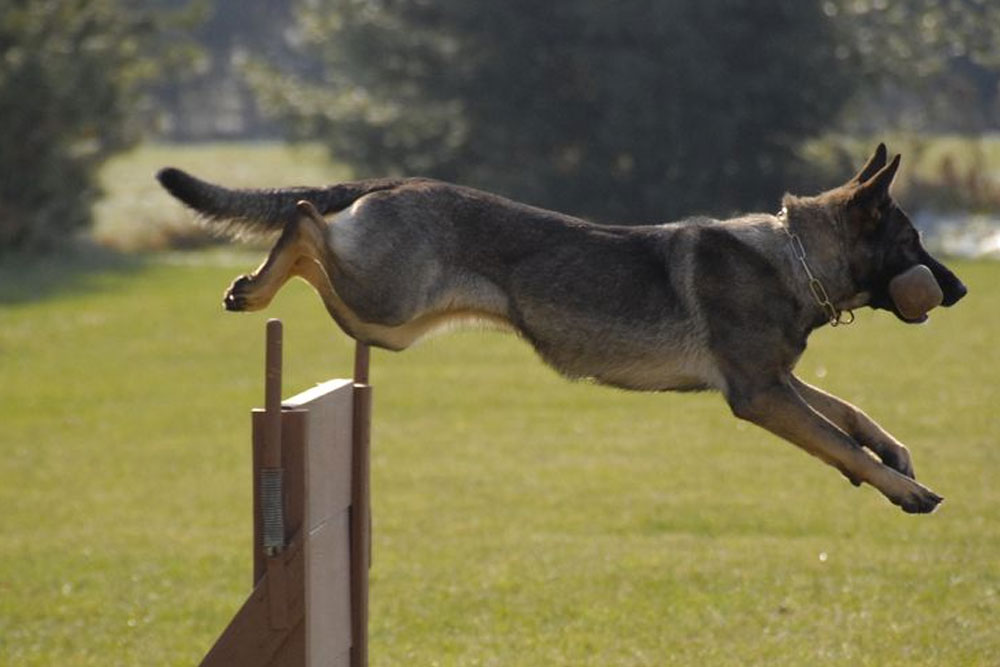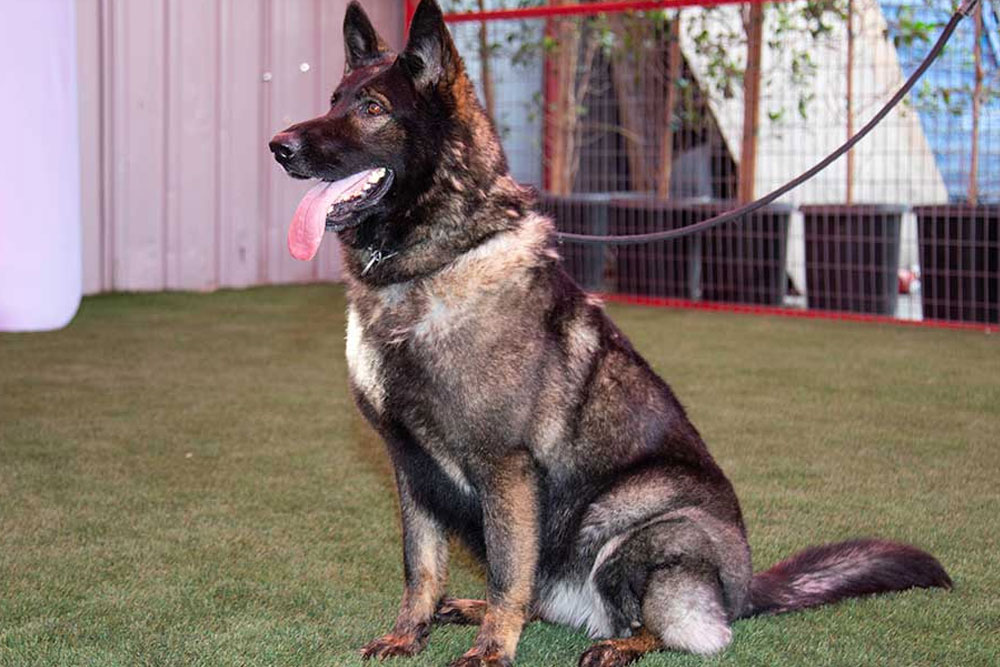Czech German Shepherds, also known as Czechoslovakian German Shepherds or Czech working line German Shepherds, are a distinct and highly regarded breed within the German Shepherd family.
In this article, we will provide a comprehensive overview of Czech German Shepherds, delving into their defining characteristics, including their physical appearance, temperament, and working abilities.
We will explore their origins and historical significance, highlighting their role in law enforcement and military work.
Table of Contents
History of Czech German Shepherds
Czech German Shepherds, also known as Czechoslovakian German Shepherds or Czech working line German Shepherds, have a rich history and distinct characteristics that set them apart from other German Shepherd breeds.
- Origin of the Breed:
Czech German Shepherds trace their roots back to the former Czechoslovakia, particularly the Czech Republic, where the breed was developed during the early 20th century. The breed was specifically bred for its working abilities, primarily as police and military service dogs.
Breeders aimed to create a versatile, intelligent, and agile working dog capable of excelling in various tasks. - Historical Significance:
Due to their exceptional working capabilities, Czech German Shepherds gained significant recognition and were widely used by law enforcement agencies and the military.
They played a crucial role during World War II and the Cold War era, assisting in tracking, search and rescue missions, detecting explosives, and apprehending suspects. Their strong drive, unwavering loyalty, and remarkable scenting abilities made them invaluable assets in various operational environments. - Notable Characteristics:
a) Temperament: Czech German Shepherds are known for their high drive and working spirit. They possess an intense focus, determination, and an innate desire to please their handlers.
They exhibit a remarkable work ethic and thrive on mental and physical stimulation. These dogs are highly trainable, making them ideal for advanced obedience, agility, tracking, and protection work.
b) Physical Attributes: Czech German Shepherds typically display a more compact and muscular build compared to their show-line counterparts. They exhibit a deep chest, strong bones, and a well-defined, agile body structure. Their coats are usually dense and thick, providing insulation and protection in harsh weather conditions.
c) Intelligence and Trainability: Czech German Shepherds are highly intelligent and quick learners. They possess a strong problem-solving ability and can adapt to various training methodologies. Their sharp minds and exceptional trainability make them excel in advanced obedience, scent work, and other specialized tasks.
d) Drives and Energy Level: These dogs possess a strong prey drive, which contributes to their excellent tracking and scenting abilities. They exhibit high energy levels and require regular mental and physical exercise to stay content and well-balanced. Engaging in activities such as tracking, agility, and obedience work is essential for their overall well-being.
Characteristics of Czech German Shepherds
- Physical Appearance:
Czech German Shepherds typically exhibit a more compact and muscular build compared to their show-line counterparts. They have a well-defined, agile body structure with a deep chest and strong bone structure.
These dogs showcase a harmonious balance between athleticism and power. Their coats are usually dense and thick, providing insulation and protection in various weather conditions. The coloration of their coats can vary, including black, sable, or bi-color variations. - Temperament and Behavior:
Czech German Shepherds are known for their strong, confident, and focused temperament. They possess an intense drive and an unwavering work ethic. These dogs are highly energetic, alert, and always ready for action.
They exhibit remarkable loyalty and dedication to their handlers, making them excellent working dogs and companions. While they are naturally protective, they are also typically known to be well-balanced and good-natured when properly socialized and trained. - Intelligence and Trainability:
Czech German Shepherds are highly intelligent and possess a keen problem-solving ability. They are quick learners and thrive on mental stimulation and engagement. Their high trainability allows them to excel in a wide range of activities and tasks.
Whether it’s advanced obedience, agility, scent work, or protection training, these dogs have the capacity to learn and perform complex tasks with precision and reliability. Their intelligence and trainability make them a popular choice for various working roles and competitive dog sports. - Protective Instincts:
One of the notable characteristics of Czech German Shepherds is their inherent protective instincts. These dogs have a strong sense of loyalty and possess a natural inclination to protect their family and territory.
Their protective nature, combined with their intelligence and trainability, makes them well-suited for roles such as personal protection dogs and police work. Proper socialization and training are crucial to ensure that their protective instincts are directed appropriately and under control.

Training and Socialization
Training and socialization play pivotal roles in shaping the behavior, temperament, and overall well-being of Czech German Shepherds. These intelligent and highly driven dogs require early and consistent training as well as positive socialization experiences to develop into well-rounded and balanced companions.
Importance of Early Training and Socialization:
Early training and socialization are crucial for Czech German Shepherds to establish a strong foundation for their development.
Puppies training should begin as soon as you bring home. This early start helps to prevent the development of unwanted behaviors and ensures they understand boundaries and expectations.
Similarly, socialization exposes them to various people, animals, environments, and situations, helping them become confident, adaptable, and friendly adult dogs.
Effective Training Techniques for Czech German Shepherds:
a) Positive Reinforcement: Czech German Shepherds respond exceptionally well to positive reinforcement training methods. Reward-based training, using treats, praise, and play, motivates and reinforces desired behaviors. This approach helps build a strong bond with your dog and promotes a positive learning experience.
b) Consistency and Patience: Consistency is key in training Czech German Shepherds. Set clear expectations and use consistent cues and commands. Additionally, be patient and allow for incremental progress, as these dogs thrive on gradual learning and understanding. Rushing the training process can lead to frustration and confusion.
c) Mental Stimulation: Czech German Shepherds are highly intelligent and require mental stimulation alongside physical exercise. Incorporate interactive toys, puzzle games, and obedience exercises that challenge their problem-solving abilities and engage their minds. Mental stimulation helps prevent boredom and enhances their overall focus and attention.
d) Professional Training: Consider enrolling your Czech German Shepherd in professional training classes. Professional trainers can provide expert guidance and help address specific training goals or behavioral issues. Group classes also offer opportunities for controlled socialization, allowing your dog to interact with other dogs and people in a controlled environment.
Socialization Tips for a Well-Rounded Dog:
a) Early Exposure: Begin socializing your Czech German Shepherd puppy early, introducing them to a wide range of people, including adults, children, and individuals with different appearances and personalities. Expose them to various environments, sounds, and surfaces to ensure they become comfortable and confident in different situations.
b) Positive Experiences: Make every socialization experience positive and rewarding for your dog. Use treats, praise, and play to associate positive associations with new people, animals, and environments. Encourage gentle interactions and monitor their reactions to ensure their comfort and safety.
c) Controlled Introductions: When introducing your Czech German Shepherd to new dogs, do so in controlled settings, such as supervised playdates or structured group training classes. Gradually increase the complexity of social interactions while monitoring their behavior and body language. Ensuring positive experiences during interactions with other dogs is essential for healthy socialization.
d) Continued Socialization: Socialization should be an ongoing process throughout your Czech German Shepherd’s life. Regularly expose them to new experiences, environments, and people to reinforce their positive social behavior and prevent regression.
Health and Care
Czech German Shepherds, like any other dog breed, require proper health care and maintenance to ensure they lead healthy and fulfilling lives.
Common Health Issues in Czech German Shepherds:
a) Hip and Elbow Dysplasia: Czech German Shepherds are prone to hip and elbow dysplasia, which are genetic conditions affecting the joints. Regular screenings and appropriate breeding practices can help reduce the risk of these conditions.
b) Degenerative Myelopathy: This progressive disease affects the spinal cord and can lead to mobility issues. While not exclusive to Czech German Shepherds, they are among the breeds more susceptible to this condition. Regular exercise and maintaining a healthy weight can help manage the risk.
c) Digestive Issues: Some Czech German Shepherds may be prone to digestive issues like food allergies or sensitivities. Monitoring their diet and providing high-quality, easily digestible food can help prevent and manage such issues.
d) Bloat: Also known as gastric torsion or twisted stomach, bloat is a potentially life-threatening condition. To minimize the risk, feed your Czech German Shepherd smaller, frequent meals, and avoid vigorous exercise right after meals.
Tips for Maintaining Good Health:
a) Regular Veterinary Check-ups: Schedule routine check-ups with a veterinarian to monitor your dog’s overall health, administer vaccinations, and address any concerns promptly.
b) Vaccinations and Preventative Care: Follow a vaccination schedule recommended by your veterinarian to protect your Czech German Shepherd against common diseases. Additionally, use appropriate preventative treatments for parasites such as fleas, ticks, and heartworms.
c) Exercise and Mental Stimulation: Czech German Shepherds are highly active and intelligent dogs that require daily exercise and mental stimulation. Engage them in activities like daily walks, obedience training, interactive play, and puzzle toys to keep them physically fit and mentally stimulated.
d) Weight Management: Maintain a healthy weight for your Czech German Shepherd through a balanced diet and regular exercise. Obesity can lead to various health issues, including joint problems and decreased life expectancy.
Proper Nutrition and Exercise Requirements:
a) Nutrition: Feed your Czech German Shepherd a high-quality, balanced diet formulated for their specific life stage (puppy, adult, or senior). Ensure the diet includes adequate protein, essential fatty acids, vitamins, and minerals. Consult your veterinarian for specific dietary recommendations based on your dog’s individual needs.
b) Exercise: Czech German Shepherds thrive on regular exercise. Aim for at least one to two hours of physical activity daily, including walks, jogging, interactive play sessions, and training exercises. However, be mindful not to overexert them, especially during extreme weather conditions.
Grooming Needs:
a) Coat Care: Czech German Shepherds have a dense double coat that requires regular brushing to remove loose hair and prevent matting. Brush their coat at least once or twice a week. During shedding seasons, daily brushing may be necessary to manage the increased hair loss.
b) Bathing: Bathe your Czech German Shepherd as needed, using a mild dog shampoo. Be mindful not to over-bathe, as it can strip the natural oils from their coat and lead to skin dryness.
c) Nail Trimming: Regularly trim your dog’s nails to keep them at an appropriate length. Long nails can cause discomfort and affect their gait.
d) Dental Care: Maintain good dental hygiene by brushing your Czech German Shepherd’s teeth regularly using a dog-specific toothbrush and toothpaste. Dental chews or treats can also help promote oral health.
Stories and Experiences of Czech German Shepherd Owners:
The stories and experiences of Czech German Shepherd owners are a testament to the exceptional qualities of this magnificent breed. Owners often share tales of their dog’s unwavering loyalty, intelligence, and working prowess.
Owners recount the deep bond they share with their Czech German Shepherds, expressing admiration for their protective instincts and their ability to quickly learn and excel in various training disciplines. These firsthand accounts highlight the remarkable impact that Czech German Shepherds have on their owners’ lives, not only as working dogs but also as cherished family members who bring joy, security, and unwavering companionship.
What is the difference between Czech German Shepherds and other German Shepherds?
Czech German Shepherds differ from other German Shepherds in terms of their breeding focus, working abilities, and specific traits. They are known for their exceptional work drive and strong protective instincts.
Are Czech German Shepherds suitable for families with children?
Yes, Czech German Shepherds can be suitable for families with children. However, proper training, socialization, and supervision are crucial to ensure a harmonious relationship between the dog and children.
Do Czech German Shepherds require special training methods?
Czech German Shepherds respond well to positive reinforcement training methods. Consistency, patience, and clear communication are key to their successful training.
How can I socialize my Czech German Shepherd properly?
Socializing your Czech German Shepherd involves exposing them to various environments, people, animals, and experiences in a positive and controlled manner. Puppy classes, controlled interactions, and regular outings can contribute to their social development.
What are the common health issues in Czech German Shepherds?
Common health issues in Czech German Shepherds include hip and elbow dysplasia, degenerative myelopathy, bloat, and allergies. Regular veterinary check-ups and responsible breeding practices are important for their overall health.
How often should I groom my Czech German Shepherd?
Czech German Shepherds have a low-maintenance coat. Regular brushing, approximately two to three times a week, helps to keep their coat clean and free from tangles. Baths can be given as needed.
Conclusion
Czech German Shepherds truly embody magnificence in every aspect. From their rich history and origins as working dogs in Czechoslovakia to their impressive physical appearance, unwavering loyalty, and exceptional intelligence, these dogs have captivated the hearts of enthusiasts and professionals alike.
Their remarkable working abilities, coupled with their strong protective instincts, make them invaluable assets in various fields, including law enforcement, military service, and search and rescue operations.
Through proper training, socialization, and care, German Shepherds can flourish into well-rounded and devoted companions. Whether as working dogs or family pets, their incredible attributes and unique qualities continue to astound and inspire admiration.
For those seeking a remarkable canine companion that combines beauty, intelligence, and unwavering loyalty, discovering the magnificence of German Shepherds is an experience that is sure to leave a lasting impression.

I’m David, an expert contributor and writer, with two furry friends of my own, I know the challenges of raising and caring for dogs. From training to nutrition and health, my goal is to provide valuable insights and advice to help create strong bonds and happy, healthy lives. Find me in Twitter.




